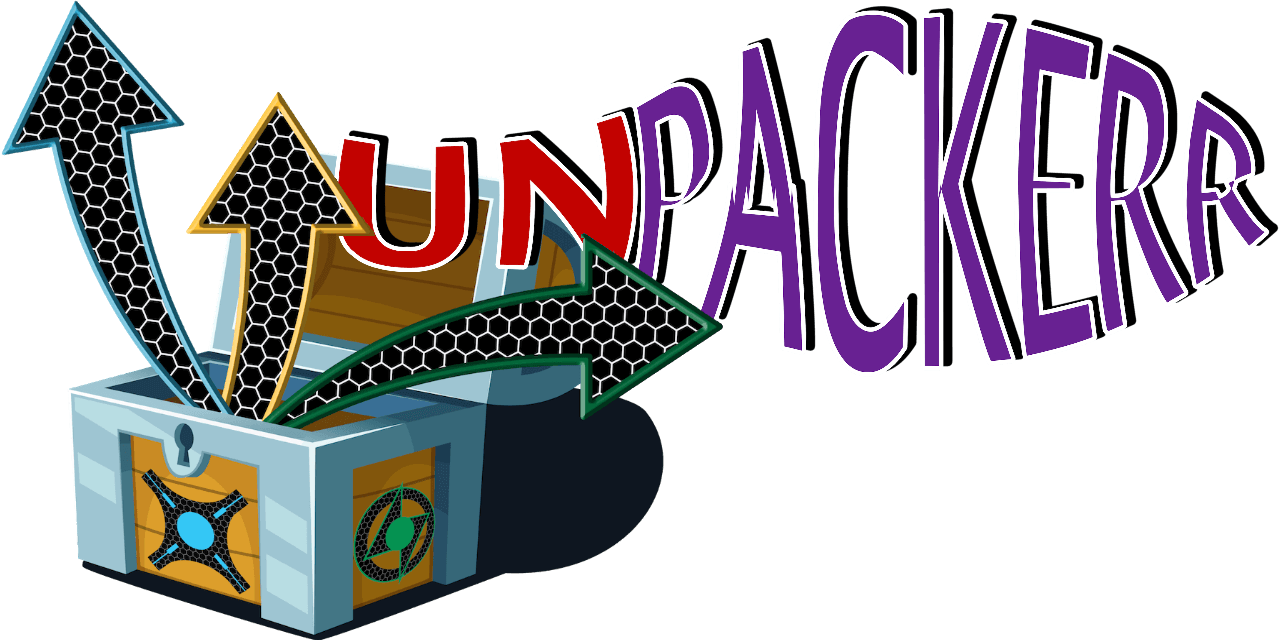About
This application runs as a daemon on your download host. It checks for completed downloads and extracts them so Lidarr, Radarr, Readarr, and Sonarr may import them. There are a handful of options out there for extracting and deleting files after your client downloads them. I just didn't care for any of them, so I wrote my own. I wanted a small single-binary with reasonable logging that can extract downloaded archives and clean up the mess after they've been imported.
Not a starr app user, and just need to extract files? We do that too. This application can run standalone and extract files found in a "watch" folder. In other words, you can configure this application to watch your download folder, and it will happily extract everything you download. This has nothing to do with the four Starr apps mentioned in the previous paragraph. This Folder-watch feature may be used with or without Starr apps.
What's it extract?
Pretty much everything. It also extracts recursively, meaning deep within folders, and archives within archives. Tars, Rars, Zips, 7-Zips, Gzips, Tarred gzips and bzips; encrypted rars and 7zips. And ISO disc images. Need something else? Ask. Does it do too much? Let me know what knobs you need. Open a request!
Installation
- Note: Requires access to your download location.
Make sure you set the
pathvariables correctly in the configuration. Even if they're set incorrectly this app makes a best effort attempt to locate your downloads.
Docker
This project used to build automatically in Docker Cloud
and create ready-to-use multi-architecture images.
Then Docker said I have to pay some ridiculous amount of money to do that, so now I just build
the images locally and push them when there's a new version.
The latest tag is always a tagged release in GitHub. Recommend using that.
Use the methods below to install using Docker.
unRAID (Docker)
- Unpackerr is available in the Community Applications on unRAID.
Docker Config File
- Copy the example config file from this repo.
- Then grab the image from docker hub and run it using an overlay for the config file's directory.
- The config file must be at
/config/unpackerr.conf. - Recommend bind-mounting
/configas an app-data directory. Example Follows.
docker pull golift/unpackerr
docker run -d -v /mnt/HostDownloads:/downloads -v /folder/with/config/file:/config golift/unpackerr
docker logs <container id from docker run>Docker Compose
- Copy the example docker-compose.yml from this repo.
- Edit the docker-compose.yml file with your environment variables and save
docker-compose up -dDocker Env Variables
- Instead of a config file, you may configure the docker container with environment variables.
- Any variable not provided takes the default.
- Must provide URL and API key for Sonarr or Radarr or Lidarr or any combination.
- You may provide multiple sonarr, radarr or lidarr instances using
UN_SONARR_1_URL,UN_SONARR_2_URL, etc.
Global Settings
| Config Name | Variable Name | Default / Note |
|---|---|---|
| debug | UN_DEBUG |
false / Turns on more logs |
| log_file | UN_LOG_FILE |
None by default. Optionally provide a file path to write logs |
| log_files | UN_LOG_FILES |
10 / Log files to keep after rotating. 0 disables rotation |
| log_file_mb | UN_LOG_FILE_MB |
10 / Max size of log files in megabytes |
| interval | UN_INTERVAL |
2m / How often apps are polled, recommend 1m to 5m |
| start_delay | UN_START_DELAY |
1m / Files are queued at least this long before extraction |
| retry_delay | UN_RETRY_DELAY |
5m / Failed extractions are retried after at least this long |
| max_retries | UN_MAX_RETRIES |
3 / Times to retry failed extractions. 0 = unlimited. |
| parallel | UN_PARALLEL |
1 / Concurrent extractions, only recommend 1 |
| file_mode | UN_FILE_MODE |
0644 / Extracted files are written with this mode |
| dir_mode | UN_DIR_MODE |
0755 / Extracted folders are written with this mode |
| passwords | UN_PASSWORD_0 |
No default; empty list. Provide a list of RAR passwords to try. |
Note about about providing passwords. If a wrong password is provided, the entire archive must
be read before we know it's a bad password. Providing many passwords here can drastically slow down
extractions and cause extra disk IO. You may also specify a password file by prefixing it with filepath:
Sonarr
| Config Name | Variable Name | Default / Note |
|---|---|---|
| sonarr.url | UN_SONARR_0_URL |
No Default. Something like: http://localhost:8989 |
| sonarr.api_key | UN_SONARR_0_API_KEY |
No Default. Provide URL and API key if you use Sonarr |
| sonarr.paths | UN_SONARR_0_PATHS_0 |
/downloads List of paths where content is downloaded for Sonarr |
| sonarr.protocols | UN_SONARR_0_PROTOCOLS |
torrent Protocols to process. Alt: torrent,usenet |
| sonarr.timeout | UN_SONARR_0_TIMEOUT |
10s / How long to wait for the app to respond |
| sonarr.delete_orig | UN_SONARR_0_DELETE_ORIG |
false / Delete archives after import? Recommend not setting this to true |
| sonarr.delete_delay | UN_SONARR_0_DELETE_DELAY |
5m / Extracts are deleted this long after import, -1s to disable |
| sonarr.syncthing | UN_SONARR_0_SYNCTHING |
false / Setting this to true makes unpackerr wait for syncthing to finish |
Radarr
| Config Name | Variable Name | Default / Note |
|---|---|---|
| radarr.url | UN_RADARR_0_URL |
No Default. Something like: http://localhost:7878 |
| radarr.api_key | UN_RADARR_0_API_KEY |
No Default. Provide URL and API key if you use Radarr |
| radarr.paths | UN_RADARR_0_PATHS_0 |
/downloads List of paths where content is downloaded for Radarr |
| radarr.protocols | UN_RADARR_0_PROTOCOLS |
torrent Protocols to process. Alt: torrent,usenet |
| radarr.timeout | UN_RADARR_0_TIMEOUT |
10s / How long to wait for the app to respond |
| radarr.delete_orig | UN_RADARR_0_DELETE_ORIG |
false / Delete archives after import? Recommend not setting this to true |
| radarr.delete_delay | UN_RADARR_0_DELETE_DELAY |
5m / Extracts are deleted this long after import, -1s to disable |
| radarr.syncthing | UN_RADARR_0_SYNCTHING |
false / Setting this to true makes unpackerr wait for syncthing to finish |
Lidarr
| Config Name | Variable Name | Default / Note |
|---|---|---|
| lidarr.url | UN_LIDARR_0_URL |
No Default. Something like: http://localhost:8686 |
| lidarr.api_key | UN_LIDARR_0_API_KEY |
No Default. Provide URL and API key if you use Lidarr |
| lidarr.paths | UN_LIDARR_0_PATHS_0 |
/downloads List of paths where content is downloaded for Lidarr |
| lidarr.protocols | UN_LIDARR_0_PROTOCOLS |
torrent Protocols to process. Alt: torrent,usenet |
| lidarr.timeout | UN_LIDARR_0_TIMEOUT |
10s / How long to wait for the app to respond |
| lidarr.delete_orig | UN_LIDARR_0_DELETE_ORIG |
false / Delete archives after import? Recommend not setting this to true |
| lidarr.delete_delay | UN_LIDARR_0_DELETE_DELAY |
5m / Extracts are deleted this long after import, -1s to disable |
| lidarr.syncthing | UN_LIDARR_0_SYNCTHING |
false / Setting this to true makes unpackerr wait for syncthing to finish |
Readarr
| Config Name | Variable Name | Default / Note |
|---|---|---|
| readarr.url | UN_READARR_0_URL |
No Default. Something like: http://localhost:8787 |
| readarr.api_key | UN_READARR_0_API_KEY |
No Default. Provide URL and API key if you use Readarr |
| readarr.paths | UN_READARR_0_PATHS_0 |
/downloads List of paths where content is downloaded for Readarr |
| readarr.protocols | UN_READARR_0_PROTOCOLS |
torrent Protocols to process. Alt: torrent,usenet |
| readarr.timeout | UN_READARR_0_TIMEOUT |
10s / How long to wait for the app to respond |
| readarr.delete_orig | UN_READARR_0_DELETE_ORIG |
false / Delete archives after import? Recommend not setting this to true |
| readarr.delete_delay | UN_READARR_0_DELETE_DELAY |
5m / Extracts are deleted this long after import, -1s to disable |
| readarr.syncthing | UN_READARR_0_SYNCTHING |
false / Setting this to true makes unpackerr wait for syncthing to finish |
Folder
Folders are a way to watch a folder for things to extract. You can use this to monitor your download client's "move to" path if you're not using it with an *arr app.
| Config Name | Variable Name | Default / Note |
|---|---|---|
| folder.path | UN_FOLDER_0_PATH |
No Default; folder to watch for archives. Not for Starr apps |
| folder.extract_path | UN_FOLDER_0_EXTRACT_PATH |
Where to extract to. Default is the same as path |
| folder.delete_after | UN_FOLDER_0_DELETE_AFTER |
10m Delete extracted files and/or archives after this duration; 0 disables |
| folder.disable_log | UN_FOLDER_0_DISABLE_LOG |
false Turns off creation of extraction logs files for this folder |
| folder.delete_original | UN_FOLDER_0_DELETE_ORIGINAL |
false Delete archives after successful extraction |
| folder.delete_files | UN_FOLDER_0_DELETE_FILES |
false Delete extracted files after successful extraction |
| folder.move_back | UN_FOLDER_0_MOVE_BACK |
false Move extracted items back into original folder |
| folder.extract_isos | UN_FOLDER_0_EXTRACT_ISOS |
false Setting this to true enables .iso file extraction |
Command Hooks
Unpackerr can execute commands (or scripts) before and after an archive extraction.
The only thing required is a command. Name is optional, and used in logs only.
Setting shell to true executes your command after /bin/sh -c or cmd.exe /c
on Windows.
| Config Name | Variable Name | Default / Note |
|---|---|---|
| cmdhook.command | UN_CMDHOOK_0_COMMAND |
No Default; command to run |
| cmdhook.name | UN_CMDHOOK_0_NAME |
Defaults to first word in command; provide an optional name for logs |
| cmdhook.timeout | UN_CMDHOOK_0_TIMEOUT |
Defaults to global timeout, usually 10s |
| cmdhook.silent | UN_CMDHOOK_0_SILENT |
false / Hide command output from logs |
| cmdhook.shell | UN_CMDHOOK_0_SHELL |
false / Run command inside a shell |
| cmdhook.exclude | UN_CMDHOOK_0_EXCLUDE |
[] / List of apps to exclude: radarr, sonarr, folders, etc |
| cmdhook.events | UN_CMDHOOK_0_EVENTS |
[0] / List of event IDs to send (shown under Webhooks) |
All extraction data is input to the command using environment variables, see example below.
Extracted files variables names begin with UN_DATA_FILES_.
Try /usr/bin/env as an example command to see what variables are available.
UN_DATA_OUTPUT=folder/subfolder_unpackerred
UN_PATH=folder/subfolder
UN_DATA_START=2021-10-04T23:04:27.849216-07:00
UN_REVISION=
UN_EVENT=extracted
UN_GO=go1.17
UN_DATA_ARCHIVES_2=folder/subfolder/files.zip
UN_DATA_ARCHIVES_1=folder/subfolder_unpackerred/Funjetting.r00
UN_DATA_ARCHIVES_0=folder/subfolder_unpackerred/Funjetting.rar
UN_DATA_FILES_1=folder/subfolder/Funjetting.r00
UN_DATA_BYTES=2407624
PWD=/Users/david/go/src/github.com/davidnewhall/unpackerr
UN_DATA_FILES_0=folder/subfolder/Funjetting.mp3
UN_OS=darwin
UN_DATA_FILES_3=folder/subfolder/_unpackerred.subfolder.txt
UN_DATA_FILES_2=folder/subfolder/Funjetting.rar
UN_BRANCH=
UN_TIME=2021-10-04T23:04:27.869613-07:00
UN_VERSION=
UN_DATA_QUEUE=0
SHLVL=1
UN_APP=Folder
UN_STARTED=2021-10-04T23:03:22.849253-07:00
UN_ARCH=amd64
UN_DATA_ELAPSED=20.365752ms
UN_DATA_ERROR=
Webhooks
This application can send a POST webhook to a URL when an extraction begins, and again when it finishes. Configure 1 or more webhook URLs with the parameters below. Works great with notifiarr.com. You can use requestbin.com to test and see the payload.
| Config Name | Variable Name | Default / Note |
|---|---|---|
| webhook.url | UN_WEBHOOK_0_URL |
No Default; URL to send POST webhook to |
| webhook.name | UN_WEBHOOK_0_NAME |
Defaults to URL; provide an optional name to hide the URL in logs |
| webhook.nickname | UN_WEBHOOK_0_NICKNAME |
Unpackerr / Passed into templates for telegram, discord and slack hooks |
| webhook.channel | UN_WEBHOOK_0_CHANNEL |
"" / Passed into templates for slack.com webhooks |
| webhook.timeout | UN_WEBHOOK_0_TIMEOUT |
Defaults to global timeout, usually 10s |
| webhook.silent | UN_WEBHOOK_0_SILENT |
false / Hide successful POSTs from logs |
| webhook.ignore_ssl | UN_WEBHOOK_0_IGNORE_SSL |
false / Ignore invalid SSL certificates |
| webhook.exclude | UN_WEBHOOK_0_EXCLUDE |
[] / List of apps to exclude: radarr, sonarr, folders, etc |
| webhook.events | UN_WEBHOOK_0_EVENTS |
[0] / List of event IDs to send (shown below) |
| webhook.template_path | UN_WEBHOOK_0_TEMPLATE_PATH |
"" / Instead of an internal template, provide your own |
| webhook.template | UN_WEBHOOK_0_TEMPLATE |
"" / Instead of auto template selecton, force one; options below |
| webhook.content_type | UN_WEBHOOK_0_CONTENT_TYPE |
application/json / Content-Type header sent to webhook |
Event IDs (not all of these are used in webhooks): 0 = all,
1 = queued, 2 = extracting, 3 = extract failed, 4 = extracted,
5 = imported, 6 = deleting, 7 = delete failed, 8 = deleted
Webhook Notes
Nicknameshould equal thechat_idvalue in Telegram webhooks.Channelis used as destination channel for Slack. It's not used in others.NicknameandChannelmay be used as custom values in custom templates.Nameis only used in logs, but it's also available as a template value as{{name}}.- Built-In Templates:
pushover,telegram,discord,notifiarr,slack,gotify
Example Usage
docker pull golift/unpackerr
docker run -d -v /mnt/HostDownloads:/downloads -e "UN_SONARR_0_URL=http://localhost:8989" -e "UN_SONARR_0_API_KEY=kjsdkasjdaksdj" golift/unpackerr
docker logs <container id from docker run>More Dockers!
If you want a container that has a bit more to it, you can try a third party option. The container provided by golift is from scratch so it has nothing more than a binary and a config file (with our defaults).
-
@madcatsu maintains an Alpine Docker Container for Unpackerr. (repo)
-
@hotio maintains a Custom Docker Container for Unpackerr. (repo)
Linux Install
Linux repository hosting provided by
On Linux, unpackerr runs as user:group unpackerr:unpackerr. You will need to give that
user or group read and write access to your archives. That may mean adding the unpackerr
user, for example, to the debian-transmission group.
Run this to install the golift repo and unpackerr:
curl -s https://golift.io/repo.sh | sudo bash -s - unpackerr
After install, edit the config and start the service:
sudo nano /etc/unpackerr/unpackerr.conf
sudo systemctl restart unpackerr
FreeBSD Install
- Download a package from the Releases page.
- Install it, edit config, start it.
Example of the above in shell form:
wget -qO- https://raw.githubusercontent.com/davidnewhall/unpackerr/master/scripts/install.sh | sudo bash
vi /usr/local/etc/unpackerr/unpackerr.conf
service unpackerr startOn FreeBSD the app runs as nobody. That's not very good and will probably change in the future.
macOS Install
- Use homebrew.
- Edit config file at
/usr/local/etc/unpackerr/unpackerr.conf - Start it.
- Like this:
brew install golift/mugs/unpackerr
vi /usr/local/etc/unpackerr/unpackerr.conf
brew services start unpackerrYou can also use a GUI app on a Mac instead of CLI via Homebrew:
- Download a
.dmgfile from the Releases page. - Copy the
Unpackerr.appto/Applications. - Run it. It starts in the menu bar as an icon.
- Click the menu bar icon and select
Config->Edit. - Edit the config to suit your system and save.
- Click the menu bar icon again and select
Quit. Then open the app again. - View the logs by clicking the menu bar icon and
Logs->View. - You can add it to login items to run it automatically when you login.
The .app and the Homebrew version are the same application, but one runs in GUI mode and one does not.
Windows Install
- Extract a
.exe.zipfile from the Releases page into a folder likeC:\Program Files\unpackerr\. - Run the
unpackerr.amd64.exebinary. This starts the app in the system tray. - Click the systray icon and select
Config->Edit. - Edit the config to suit your system and save.
- Click the systray icon again and select
Quit. Then open the app again. - View the logs by clicking the systray icon and
Logs->View. - Make a shortcut to the application in your Startup menu to run it when you login.
Integrations
The following fine folks are providing their services, completely free! These service integrations are used for things like storage, building, compiling, distribution and documentation support. This project succeeds because of them. Thank you!
Troubleshooting
Make sure your Downloads location matches on all your applications! Find help on Discord.
Log files:
- Linux:
/var/log/messagesor/var/log/syslog(w/ default syslog) - FreeBSD:
/var/log/syslog(w/ default syslog) - macOS:
/usr/local/var/log/unpackerr.logor~/.unpackerr/unpackerr.log - Windows:
~/.unpackerr/unpackerr.log
If transfers are in a Warning or Error state they will not be extracted. If Unpackerr prints information about transfers you do not see in your Starr app.
Permissions tend to mess things up too, so make sure the user unpackerr runs as can read and write to your download location.
Still having problems? Let me know!
Archive Support
Unpackerr will decompress archives of these types:
rar,tar,tgz,gz,zip,7z,bz2,tbz2- Multi-file archives are only supported with RAR format.
- Password protected archived are only supported with RAR format.
- Archives are detected by the file extension.
Logic
The application polls radarr, readarr, sonarr and lidarr at the interval configured. The queued items are inspected for completeness. The interval of these pollers is set in the config file. 1-10 minutes is generally sufficient.
When Unpackerr finds an item in Sonarr or Radarr or Lidarr the download location
is checked for an archive file. If an extractable archive exists, and Radarr/Sonarr/etc
has status=Completed from your download client Unpackerr will extract the file.
Files are extracted to a temporary folder, and then moved back into the download
location for Completed Download Handling to import them. When the item falls out of the
Lidarr/Radarr/Readarr/Sonarr queue, the extracted files are deleted.
Contributing
Yes, please. Just make a pull request and lets chat about it in the PR or on Discord.
License
MIT - Copyright (c) 2018-2022 David Newhall II







